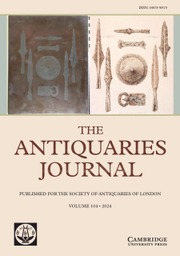No CrossRef data available.
Article contents
NATURAL HISTORY OF A BRONZE AGE JEWEL FOUND IN CRETE: THE MALIA PENDANT
Published online by Cambridge University Press: 30 September 2020
Abstract
The unique gold pendant found at Chrysolakkos, Malia, Crete, in 1930 has been variously interpreted, and usually is said to represent a pair of bees. This vague interpretation is discussed, and it is pointed out that the three discs that are suspended from the pendant closely resemble the fruits of a native Cretan herb, Tordylium apulum. Megascolia maculata, a member of the order Hymenoptera, is proposed as the model for the insects. Like a gold toggle pin, also from Chrysolakkos, the pendant demonstrates that Cretan goldsmiths were capable of creating aesthetically pleasing work by paying close attention to the local flora and fauna and used examples as the models for their unique jewellery
Keywords
- Type
- Research paper
- Information
- Copyright
- © The Author(s), 2020. Published by Cambridge University Press on behalf of The Society of Antiquaries of London


